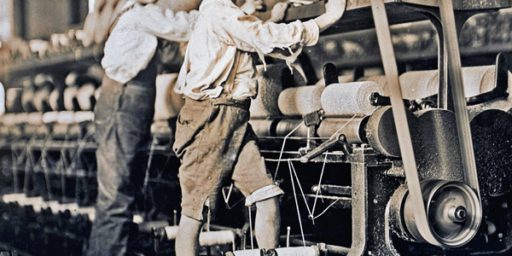How Big Is the Automobile Industry?
In recent weeks I’ve heard characterizations of how many people are employed by the automobile industry that are all across the board—from 2 million to 3 million to 7 million (Charles Dingell) all the way up to 10 million people (Michigan Gov. Jennifer Granholm). How many people are really employed by the Detroit automakers, their domestic suppliers, and distribution system? How many of these jobs are really at risk if one of them should fail?
Unless you believe that should, say, GM fail, that every employee of every GM dealer will be out of work, I think it’s specious to count all of those jobs in the total. Under those circumstances Americans will still buy cars and, presumably, there will still be retailers to sell them to them. They just won’t be GM dealers. Toyota, Hyundai, etc. dealers as well as the dealers of the remaining Detroit automakers will need to add more staff to handle their additional sales.
Please show your work.






look like we are gonna have round up the illegal aliens after all to free up some jobs.
Is it not a good reason to finally do it? The numbers are close.
Well first, let’s recall, please, the reason for the panicked tones involved… these are union jobs we’re on about. Democrats who generally don’t give a tinker’s dam for American industry, are usually overflowing with concern when it comes to union jobs. The reason Democrats consider this so important is that if the Big THree fails, the UAW and related unions fail… that translates to a loss of votes and money for Democrats.
That having been established, to your question;
Nobody, including the government, really knows how many there are, though I note a fair conversation at Althouse’s place on the point.
Surely someone would buy GM assets at some price, and continue some brands.
The interesting thing about the bailout is that we are being prodded to save Detroit when next year the Dems will drive them from business with environmental mandates.
If Detroit can’t make it when people were hungry for their stock in trade (large, gas hungry vehicles), how are they going to survive the mandate for small, quality-built, hybrid and electrical vehicles when they are already behind the curve?
Gosh, how will they do that?
That might be true. I already have a mid-size hybrid, and it cost me less than the average new car sold in America.
Here is a simple exercise. Compare the number of non-union jobs added to our economy under the last Democratic administration to the number of non-union jobs added under the current administration.
Exactly why I say as I do… that this is about saving the unions,. not the companies.
I already have. Of course I’ve taken into account 9.11 and the financial impact of that, and added it to cyclical financial trends. I’m willing to bet you bypassed those little facts. I also take into accoun as you do not, what Clinton did to help set up that economic downfall where non-union jobs were concerned:
ANd I’ll bet you can’t figure for the life of you how that might cause less non-union jobs, can you?
Oh… and if you’re going to lecture us, using union data as your reference is an instant disqualifier.
Oh… and Dave?
Here. You’ll find this helpful to a degree.
Thanks. Unfortunately, it’s not particularly helpful since it doesn’t disaggregate Big 3 from all U. S. automakers.
And of course you are ready to share your methodology and calculations with us 🙂
It’s a hard number to quantify but i’m confident it’s bigger than most people think. The tentacles go out much farther than parts suppliers and distributes…much much farther.
To me, this eager congress is hell bent on two things…saving the union and having oversight into what kind of cars that will be produced. That seems like a non winner to me. Were I GM, filing chapter 11 sounds like the best option.
One last thing, many of the suppliers supply to all the automotive companies. Should GM fail it’s probable they would take down the suppliers too. That will also get into Toyota, Nissan, etc.. It has the makings of another crisis.
Quite so…whereby ‘to a degree’ seemed appropriate.
You’ve already demonstrated such to be beyond your ken.
I have a ten year old GEO Tracker, I bet it’ s cheaper then yours, 1300 hundred dollar, has lasted me 5 years so far, 25 bucks to fill and and I haven’t killed a single glacier yet with it. lol, USED GEO’S FOR GAEA!
you think they can just build them used so I that I might be able to afford and get a new one?
Tell him about the Flinstone brakes.
(Chuckle)
Strange how liberals detest financial excess that hurts America unless it is the excess caused by their unions. Let them fail. Like alchoholics, they need to hit bottom before they can get the cure.
Lets design a twelve step plan to save Detroit
1. Dump the union contracts. The people are the higher power.
I’m not sure about the Tracker … but I think some GEOs have the about worst “deaths per million miles” recorded.
For anyone who really wants to dredge through the pdf, here it is. Hmmm. Maybe not the paper I remember, but I see this on page 16: “We excluded the high-risk Geo Metro from the analysis.”
ah well … Trackers and Metros are quite different … still the PDF is there for internet crazed shoppers 😉
yes my metro was 13 dollar from Sunday to Sunday and I worked a half an hour away. I wish I still owned it so I could put it on Ebay and get rich, well rich for a day or two lol.
ya lol, those evil SUV’s keep snatching them out of peoples back yards and having them for lunch, or is that coyote’s and poodles, I forget.
Just an aside.
Do a bit of research. You’ll find that the most deaths per million miles is in Japan.
And guess what cars THEY drive?
Yep… exactly what Al Gore wants US to drive.
It’s a difficult conversation to have, because while it may not be “large” in terms of global corporations, it provides jobs to entire cities and towns in Michigan (it being the big three). If any of the big three went under, crime would shoot up immediately in Detroit, the state of Michigan and the entire Midwest.
Bit, there has been a long enough history of small cars in the US that we have our own data. It’s in that PDF. Things that we call “midsize” can be very safe. The Camry for instance is 5 stars and has a very good real-world record. The Prius is “only” 4 stars, but that doesn’t worry me … because my other car is a full suspension mountain bike. That’s where I’ve broken my bones (4 is enough I think … they made me wait 5 hours in emergency last time before they even saw me).
(The Japanese are on the wrong side of the road ;-), totally different!)
Having been to Detroit recently, I must say I’m amazed anyone thinks a RISE in the crime rate is still possible, there.
Funny how on this subject we suddenly get isolationist. In all else, we’re supposed to be emulating this or that country… except, of course when the downsides of those policies show up. As in this case. the Japan data shows clearly that as you get smaller, the death rate goes up, in rather dramatic fashion.
There’s only so much I’ll give up for a gallon of gas. My life isn’t one of them. I’ll keep my Rainier, thank you.
Not isolationist, many of those cars in our long history of small cars were imported, and a few were even NAFTA.
My dad had a ’57 Beetle. I wonder what MPG my granddad’s Opel Kadett got? Ah, Google knows all … around 30 mpg.
And, their death rates?
My granddad made 102 the cancer took my dad somewhat sooner than that.